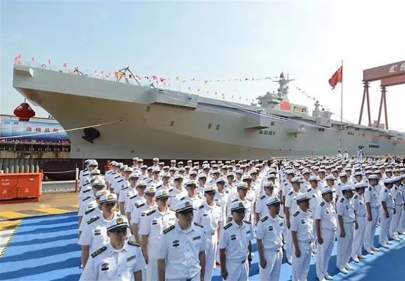China - Seize the Seas
Monday, July 10, 2023
Written by Laurence F Sanford, Senior Analyst ASCF
Categories: ASCF News ASCF Articles

China is seizing the seas by building the world’s largest Navy, the largest Coast Guard, the largest fishing fleet, the largest maritime shipping fleet, and the largest stakeholder of seaports worldwide.
China is following American Admiral Alfred T. Mahan’s (1840-1914) strategy as written in his “The Influence of Sea Power Upon History, 1660- 1783, " published in 1890. Mahan believed that national greatness was tied to the sea in peace and war and that strategic locations worldwide were key. He also believed in good political and naval leadership, alliances with other countries, and free trade.
The Chinese Communist Party’s (CCP) goal is world domination. The strategy is to make China the world's number one economic and military power through unrestricted warfare. Political, business, and military interests are fused under CCP control.
China Ocean Shipping Company (COSCO) is CCP owned and is one of the largest shipping companies in the world, with 1,114 ships. China is the largest exporter in the world, with 15% of global trade, and COSCO is by far the largest shipper in China.
Over 96 ports throughout the world have Chinese-owned stakeholders. The CCP People’s Liberation Army Navy (PLAN) has visited approximately one-third of these ports. Five ports in the United States with CCP stakeholders are Miami, Houston, Long Beach, Los Angeles, and Seattle.
Former U.S. National Security Adviser Robert McFarlane "noted that China owns 96 ports around the world in key locations for maritime trade, giving Beijing strategic dominance without having to deploy a single soldier, ship, or weapon."
Some of the more significant ports are:
● Haifa, Israel - the U.S. Sixth Fleet has expressed concerns to Israeli officials over espionage concerns when American warships dock.
● Piraeus, Greece - Located near Athens, Piraeus is an important cog in China’s Belt and Road Initiative (BRI), including the Maritime Silk Road. Since COSCO gained majority control of Piraeus in 2016, substantial investments and the influx of Chinese businesses have made Piraeus a major Mediterranean port.
● Wilhelmshaven, Germany - Home of the German Navy, China Logistics Group has a 99-year lease to build a logistics center. It is just three miles away from Germany’s largest navy base.
● Panama Canal - the Pacific and Atlantic entrances to the Panama Canal are managed by Chinese-owned CK Hutchison, the world’s leading port investor, developer, and operator spanning 54 ports and 25 countries. It is also a leader in 5G telecommunications.
● Djibouti is in the Horn of Africa, with coastlines on the Red Sea leading to the Suez Canal and the Gulf of Aden. In 2017 China fused its logistics base with the PLA and opened a military base. The United States has a military base nearby.
COSCO ships are also “floating fortresses” for the” CCP. Some ships carry a branch of the Communist Party with political commissars and a crew that must pledge allegiance to the CCP. The ships follow the party’s direction and sail for the motherland.
Summary
The CCP is following Admiral Mahan’s playbook of building a strong navy and maritime fleet with control of strategic shipping chokepoints worldwide. The flag is following the trade. By controlling ports worldwide, China is able to influence and control host countries into following, or at least being amenable, CCP policies.
For the foreseeable future, the United States cannot match China’s fleets. The U.S. does not have the industrial capacity to do so. China has 13 shipyards - the U.S. has only seven. One Chinese shipyard has more capacity than all of America’s combined.
One significant and critical difference in the U.S. favor is its alliances with other countries with shipbuilding capabilities. Japan, South Korea, Germany, Sweden, the United Kingdom, and France produce modern, sophisticated naval ships.
Submarines will play a crucial role in any future conflict. The cost of an electric-diesel submarine is one-tenth the cost of a nuclear submarine. Sweden produces the Gotland class, which can stay submerged for weeks. It is so quiet that during training exercises with the U.S. Navy’s nuclear-powered aircraft carrier USS Ronald Reagan (CVN-76), a Gotland submarine was able to run rings around and sink the Reagan multiple times.
Aircraft carriers are “waddling ducks” for destruction by missiles and submarines. The U.S. should purchase diesel-electric submarines from our allies at the cost of ten boats for the price of one nuclear sub. Numbers matter.
Increasing “gray zone” activities worldwide are needed to counter CCP unrestricted warfare against the U.S. Full mobilization is needed to counter CCP espionage efforts. The U.S. must stop CCP intellectual theft. The CCP collects intellectual theft through the internet, Chinese students, CCP business land acquisitions in the U.S., and Wall Street financing. Ban CCP-owned social media companies such as TikTok.
Peace Through Strength!
Laurence F. Sanford
Senior Analyst
American Security Council Foundation
www.ascf.us











